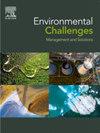Impact of ecological engineering on water quality improvement under urbanization: A case study in Xiaoqing river in Jinan, China
Q2 Environmental Science
引用次数: 0
Abstract
The Xiaoqing River serves as Jinan's primary wastewater-receiving watercourse, with municipal reclaimed water constituting its main replenishment source. Consequently, Jinan's urbanization process exerts decisive influence on the river's water quality. Through integrated analysis of urban development and ecological engineering initiatives along the river, this study conducts a temporal analysis (2011–2023) of hydrological and water quality variations in the Jinan section of the Xiaoqing River Basin, systematically investigating urban expansion impacts on aquatic ecosystems. Analysis of multi-contaminant annual variation trends reveals an initial deterioration phase followed by significant water quality improvement, with 2017 marking a pivotal transition point. Post-2017 comprehensive river remediation resulted in marked environmental quality enhancement. However, emerging challenges including escalating mitigation costs and regulatory complexities led to marginal water quality decline after 2023 navigation resumption. Findings suggest that intensified pollution control challenges emerge for Xiaoqing River water quality improvement. However, with the Jinan municipal government's increased focuses on pollution remediation and the development and utilization of Xiaoqing River, it is expected that the water resources, water ecology and water environment of Xiaoqing River will continue to be consolidated and improved after the navigation resumption.
城市化背景下生态工程对水质改善的影响——以济南小清河为例
小清河是济南市主要的污水接收水道,城市再生水是其主要补给水源。因此,济南的城市化进程对河流水质有着决定性的影响。通过综合分析沿江城市发展与生态工程举措,对小清河济南段2011-2023年水文水质变化进行时序分析,系统探讨城市扩张对水生态系统的影响。多污染物的年变化趋势分析显示,水质开始恶化,随后显著改善,2017年是一个关键的转折点。2017年后河道综合整治,环境质量明显改善。然而,新出现的挑战,包括不断上升的缓解成本和监管复杂性,导致2023年恢复通航后边际水质下降。研究结果表明,小清河水质改善面临着污染控制加剧的挑战。但随着济南市政府对小清河污染修复和开发利用的重视程度加大,预计恢复通航后,小清河的水资源、水生态和水环境将继续得到巩固和改善。
本文章由计算机程序翻译,如有差异,请以英文原文为准。
求助全文
约1分钟内获得全文
求助全文
来源期刊

Environmental Challenges
Environmental Science-Environmental Engineering
CiteScore
8.00
自引率
0.00%
发文量
249
审稿时长
8 weeks
 求助内容:
求助内容: 应助结果提醒方式:
应助结果提醒方式:


